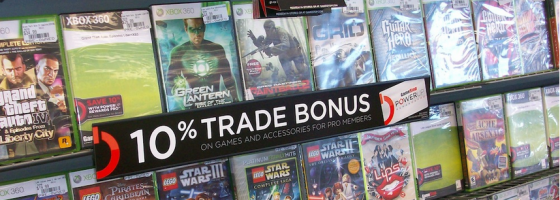It’s time to have an updated talk on the dreaded used game debate when it comes to buying and selling games. With the rise of digital distribution and streaming services, they have been a direct counter against the used game market. While this is a long standing debate, recent trends with digital and streaming could be set to mix things up.
The First Sale Doctrine:
As always with this debate, it’s important to catch everyone up on the first sale doctrine and how it relates to the secondary market. By law, the company behind a product is only allowed to make a profit on the first sale of a copy of their product. After the first sale, the copy of the product is now owned by the consumer who can do whatever they want with it.
The used games market exploded in the 90’s with stores like Babbages and Funco Land before online sites like Ebay and Amazon. When it comes to used games, most developers are not a fan of them.
Video Game Economics 101:
For those of you in the industry, this next section should be familiar to you. When a video game gets sold in a store, the price of a new copy of that title is split between the store, publisher and the developer. The exact specifics of this arrangement are usually kept private.
The reason why developers and publishers hate used games is one simple fact: They do not get a cut of the profit. When you buy a used game at GameStop, they pocket 100% of the profit. Obviously, this is why they are so adamant about selling used copies.
The critics of GameStop have a problem with the fact that a major retailer of games is direct competing with the games it’s selling. While the developer/publisher will get the payment from the first sale, GameStop receives multiple payments every time someone buys a used copy of a game.
As we’ve seen, GameStop has done some shady things in the past to get people to buy used; going as far as trying to hide the fact that someone is buying a used copy.
With that said, the game industry is not innocent on the matter, and have attempted some anti-consumer practices in the past.
Fighting the Used Market:
Developers and publishers have been trying to find a way around the used games market for years. There was Project $10, which put in one-time DLC codes for content in new copies of games. The only way to get access to that content otherwise was to spend an extra $10 on the DLC code. The thing to keep in mind is that we’re not talking about pre-order content, but full on modes or game systems that would be excluded.
As a secondary impact of Games as a Service, by continuing to support a game with more content, developers are adding additional value to a game and reducing the chance that it will be traded back. If you spent over $50 on DLC in a game, trading that game in means that you lose out on that $50.
When Microsoft was planning on making the Xbox One download only, that would have been a huge smack in the face to the used games market.
On the PC side, there have been arguments for years now regarding selling and trading game keys. It wasn’t until recently that Valve allowed you to return games you’ve bought within a limited time window.
The argument regarding ownership is still going on between the differences in various countries.
Primary vs. Secondary Market:
This is a tough debate to crack. When it comes to consumer goods and entertainment, the first sale doctrine gives them the right to do whatever they want with their copy of a product. GameStop essentially monopolizing and selling used copies over new is a very shady practice.
However, no matter how much developers and publishers plead, they will never be entitled to the second-hand sales of their games. For me, I’m in the middle as someone who buys games, but also has an understanding of the industry. Not counting GameStop, I do think there should be a second-hand market for video games; even for digital.
The reason is that even though digital keys come from an infinite source, they are only generated via a purchase. Meaning there is a finite and track-able number of keys out there. If someone is going to give the consumer more options and make them happier to buy games, then I’m for it.
As we continue to head towards a digital and streaming future, the fate of the used games market is up in the air.
If games are cheap enough that consumers aren’t tying up $50+ per game, would they still want to trade and sell their copies? If games fully commit to digital, what will that mean for the consumer rights and the first sale doctrine?
I don’t have an answer to these questions, but I do feel that it’s only a matter of time before the final nail goes into the GameStop coffin. Whether or not they take the used games market with it is another question.
What do you think about used games? Is there some middle ground that would make all parties happy?




